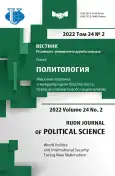Coalition or Opposition? The Behaviour of Regionalist Parties in Multi-level Competition: The Cases of the Basque Country and Scotland
- 作者: Belous Y.A.1, Tarasov A.S.2
-
隶属关系:
- National Research University Higher School of Economics
- University of Trento
- 期: 卷 24, 编号 2 (2022): World Politics and International Security Facing New Nationalism
- 页面: 317-330
- 栏目: REGIONAL ETHNO-NATIONALISM: CONFLICT AND COALITION POTENTIAL
- URL: https://journal-vniispk.ru/2313-1438/article/view/322632
- DOI: https://doi.org/10.22363/2313-1438-2022-24-2-317-330
- ID: 322632
如何引用文章
全文:
详细
This article compares the positioning behaviour of parties and reveals why one party joins a coalition, while others do not. The cases of two regionalist parties of the UK and Spain are depicted: the Scottish National Party (SNP) and Basque National Party (BNP). The study is a contribution to the problems of positioning behaviour of parties in decentralised systems with strong regionalist elements and incentives of regionalist parties (RPs) to enter a coalition with state-wide parties (SWPs). Based on process tracing and comparative analysis of the main regionalist parties, electoral data, public statements, and media statements we conclude that the ideological proxi mity on the economic dimension of the parties, and the territorial dimension are of key importance in evaluating the coalition potential between SWPs and the RPs. Moreover, competition at the regional level creates incentives for RPs to enter a coalition with SWPs and there is no evident support for the minority government to be disposed to enter a coalition rather than a majority government.
作者简介
Yulia Belous
National Research University Higher School of Economics
Email: ybelous@hse.ru
ORCID iD: 0000-0002-0871-8223
Analyst at the Center for Comprehensive European and International Studies, PhD student
Moscow, Russian FederationAndrei Tarasov
University of Trento
编辑信件的主要联系方式.
Email: andrei.tarasov@unitn.it
ORCID iD: 0000-0002-0200-8909
Research Assistant at the School of International Studies, PhD Candidate, School of International Studies
Trento, Italy参考
- Alonso, S. (2012). Challenging the state: Devolution and the battle for partisan credibility: A comparison of Belgium, Italy, Spain, and the United Kingdom. Oxford University Press.
- Barrio, A., & Rodríguez-Teruel, J. (2017). Reducing the gap between leaders and voters? Elite polarization, outbidding competition, and the rise of secessionism in Catalonia. Ethnic and Racial Studies, 40(10), 1776-1794.
- Blarel, N., & Van Willigen, N. (2021). How do regional parties influence foreign policy? Insights from multilevel coalitional bargaining in India. European Journal of International Relations, 27(2), 478-500.
- Bullmann, U. (1996). The politics of the third level. Regional & Federal Studies, 6(2), 3-19. https://doi.org/10.1080/13597560802351655
- De la Granja, J., De Pablo Contreras, S., Pobes, C., & Olábarri Gortázar, I. (2020). Breve historia de Euskadi. De los Fueros a nuestros días. Barcelona: Grupo Penguin Random House. (In Spanish).
- Döring, H., & Hellström, J. (2013). Who gets into government? Coalition formation in European democracies. West European Politics, 36(4), 683-703. https://doi.org/10.1080/01402382.2013.783347
- Falcó-Gimeno, A., & Verge, T. (2013). Coalition trading in Spain: Explaining state-wide parties’ government formation strategies at the regional level. Regional & Federal Studies, 23(4), 387-405.
- Field, B. N. (2016). Why minority governments work: Multilevel territorial politics in Spain. Springer.
- Field, B. N., & Hamann, K. (2015). Framing legislative bills in parliament: Regional-nationalist parties’ strategies in Spain’s multinational democracy. Party Politics, 21(6), 900-911.
- Filippova, E. Y. (2021). Factors of coalitional governments formation between regionalist and nationwide political parties in regions of Spain. World Economy and International Relations, 65(4), 71-79. (In Russian).
- Grabevnik, M. V. (2021). Party strength of regionalist parties of United Kingdom: Conceptualisation and measuring. RUDN Journal of Political Science, 23(3), 463-478. (In Russian).
- Hooghe, L. (1996). Cohesion Policy and European Integration: Building Multi-level Governance. Oxford University Press.
- Jeram, S. (2014). Sub-state nationalism and immigration in Spain: Diversity and identity in Catalonia and the Basque Country. Ethnopolitics, 13(3), 225-244.
- Leon, S., & Jurado, I. (2020). Multilevel Governance in Spain. In D. Muro, I. Lago. (Eds.), The Oxford Handbook of Spanish Politics (pp. 224-240). Oxford: Oxford University Press.
- Marks, G. (1993). Structural Policy and Multilevel Governance in EU. In A. Cafruny, G. Rosental (Eds.), The State of the European Community: the Maastricht debate and beyond (pp. 391- 411). Boulder, CO: Lynne Rienner.
- Massetti, E. (2009). Explaining regionalist party positioning in a multi-dimensional ideological space: A framework for analysis. Regional and federal studies, 19(4-5), 501-531. https://doi. org/10.1080/13597560903310246
- Massetti, E., & Schakel, A. H. (2015). From class to region: How regionalist parties link (and subsume) left-right into centre-periphery politics. Party Politics, 21(6), 866-886.
- Mees, L. (2015). Nationalist politics at the crossroads: The Basque nationalist party and the challenge of sovereignty (1998-2014). Nationalism and Ethnic Politics, 21(1), 44-62. https://doi.org/10.1080/13537113.2015.1003487
- Schakel, A. (2020). Multi-level governance in a ‘Europe with the regions’. The British Journal of Politics and International Relations, 22(4), 767-775.
- Scottish National Party. (2021). Scotland’s Future. Scotland’s Choice. Manifesto 2021 [E-book]. https://issuu.com/hinksbrandwise/docs/04_15_snp_manifesto_2021___a4_document?mode=window
- Ştefuriuc, I. (2009). Government formation in multi-level settings: Spanish regional coalitions and the quest for vertical congruence. Party Politics, 15(1), 93-115.
- Stephenson, P. (2013). Twenty years of multi-level governance: ʻWhere does it come from? What is it? Where is it going?’ Journal of European Public Policy, 20(6), 817-837.
- Tronconi, F. (2015). Ethno-regionalist parties in regional government: Multilevel coalitional strategies in Italy and Spain. Government and Opposition, 50(4), 578-606.
补充文件









